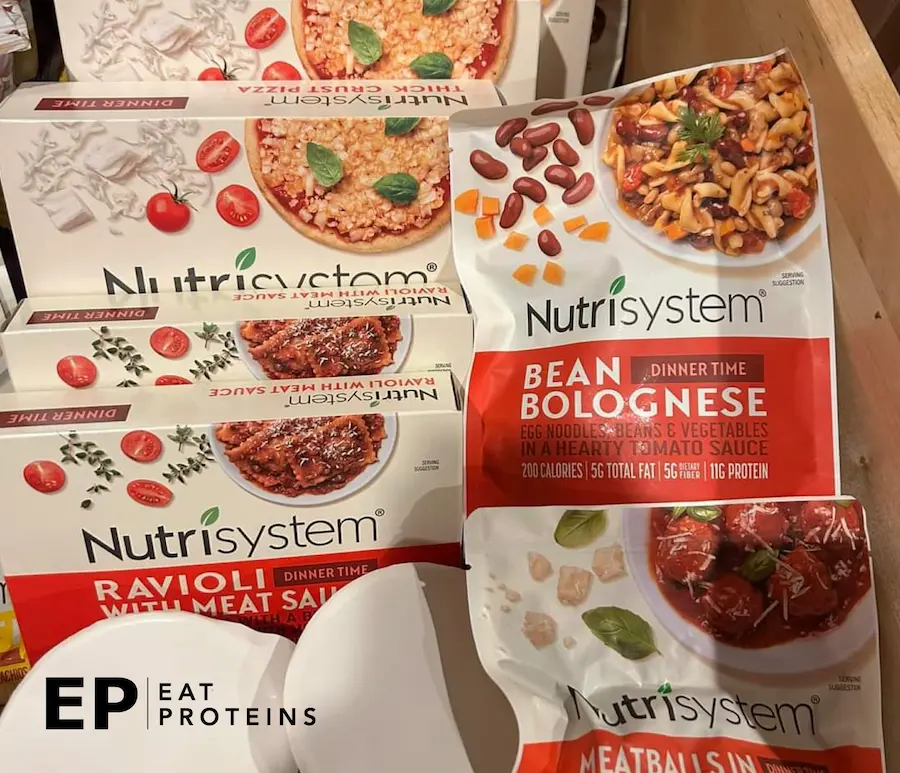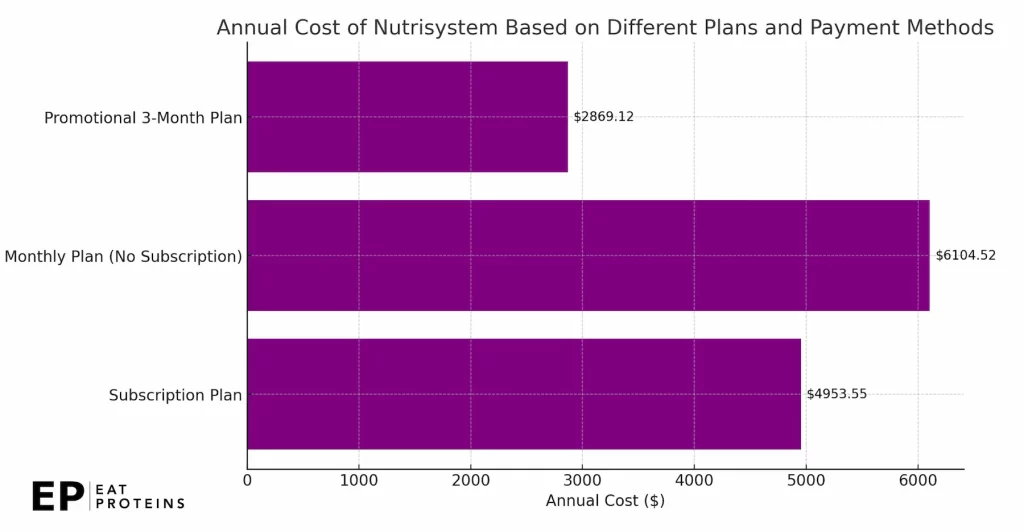Nutrisystem refers to a commercial provider of weight loss products and services that offers a variety of meal plans designed to help people lose weight. According to a 2015 study by Kimberly A. Gudzune from The Johns Hopkins University School of Medicine, Nutrisystem resulted in at least 3.8% greater weight loss at 3 months compared to control/education and counseling groups.
Headquartered in Fort Washington, Pennsylvania, and led by President Stephen Mikulak as of 2021, the Nutrisystem delivers pre-packaged, portion-controlled meals that include a balanced ratio of protein, carbohydrates, and fats. Known as one of the best weight loss diets, Nutrisystem competes with major brands like Weight Watchers, Optavia, and Weight Watchers, and has acquired rights to Jenny Craig’s intellectual property through its parent company, Wellful Inc.
Although the company has been endorsed by Marie Osmond, who recently revealed her 50-lb weight loss transformation, the reviews for Nutrisystem are mixed. ConsumerAffairs gives the program a rating of 1.4 out of 5 based on 4,172 reviews, with 26% being 1-star ratings. On the other hand, Trustpilot rates Nutrisystem at 1.5 out of 5, based on 2,147 reviews, where 21% are 1-star. As a result, questions arise regarding the value of Nutrisystem meals and diet plans, whether they are worth the cost, and what alternative weight loss diets are available.
What is a Nutrisystem Diet?
The Nutrisystem Diet is a weight loss diet that delivers premade meals, shakes, and snacks directly to your doorstep, focusing primarily on providing meals rather than long-term weight management strategies.
According to a 2017 study by Claire Baetge from the University of Texas San Antonio, participants in the Nutrisystem Advance Select program experienced a significant weight loss of 5.03 kg (approximately 11.1 pounds) over a 3-month (12-week) period, but the program did not show significant improvements in metabolic syndrome prevalence. A 2016 study led by A Z W Chaudhry of Johns Hopkins University found that Nutrisystem lowered hemoglobin A1c levels by an additional 0.3% compared to counseling alone over six months in overweight and obese individuals with type 2 diabetes.
When asking who Nutrisystem diet is for, it’s worth noting that the program caters to adults leading busy lives, offering a variety of plans and meals that are either flash-frozen or non-perishable and require little time to prepare.
What are the different plans available in the Nutrisystem Diet?
This is the list of 6 Nutrisystem Plans.
- Nutrisystem Partner Plan
- Nutrisystem Complete 55 Plan
- Nutrisystem Women’s Plan
- Nutrisystem Men’s Plan
- Nutrisystem Quick 9 Plan
- Nutrisystem Diabetes Plan
These six plans are further divided into three categories, and the number of meals you receive will depend on the specific plan you choose. This table shows the three tiers of Nutrisystem plans.
| Nutrisystem plans | Number of meals | Menu |
|---|---|---|
| Basic | 5 days of meals (breakfast, lunch, dinner, and snacks) | Basic |
| Uniquely Yours | 5 days of meals (breakfast, lunch, dinner, and snacks) | Fancy |
| Uniquely Yours Max | 7 days of meals (breakfast, lunch, dinner, and snacks) | Fancy |
How does the Nutrisystem Diet work?
The Nutrisystem diet works by delivering prepackaged meal replacements that are formulated with daily recommended portions of fats, carbs, fiber, and protein. During the first week, you are advised to drink 8 cups of water, consume at least four servings of non-starchy vegetables, and eat three pre-packaged meals and two snacks daily.
From the second week onward, you continue with these goals while also having the option to consume low-calorie “extra” foods and gradually integrate “Flex” meals from home. The program aims to keep you feeling full while encouraging a transition to self-prepared meals after you reach your target weight.
And while Nutrisystem has received various awards, including a Silver Stevie Award in the 17th Annual Stevie Awards for Sales & Customer Service, marking its eighth consecutive year of recognition, the diet has received mixed reviews.
What are the reviews of the Nutrisystem Diet?
Reviews of the Nutrisystem Diet are mixed, with healthcare professionals offering both support and critique. Tim Martin, MD, a Family Physician from Texas, praises Nutrisystem for its convenience, particularly for those with time constraints or limited cooking skills. However, he notes that the program doesn’t offer long-term dietary education and leaves customers wondering what to do post-Nutrisystem.
Natalie Fox, a Registered Dietitian, raises concerns about the calorie content of Nutrisystem meals, suggesting that the 1,200 to 1,500 daily calorie range may be misleading and could technically meet clinical criteria for malnutrition, particularly for active individuals, as shown in this video.
What are the Nutrisystem reviews by customers?
Customer reviews of Nutrisystem are mixed. Some users praise the program for its convenient, flash-frozen meals and report successful weight loss, noting improvements in the food quality over the years.
On the other hand, numerous customers express dissatisfaction with the billing practices, stating that the company makes it difficult to cancel subscriptions and may charge for additional months without clear consent. Issues with the taste of some of the prepackaged food items and concerns about being “tricked” into ongoing subscriptions are also common criticisms.
What are the reviews of the Nutrisystem Diet meals?
Reviews of Nutrisystem Diet meals are varied. Some customers have had positive experiences, praising the taste of certain meals and reporting significant weight loss, like 40 to 60 pounds within a year.
However, others have criticized specific meal options, calling out dishes like chicken enchiladas and stuffed shells as less than palatable. Additionally, there are complaints about missing items in orders, such as shakes, and difficulties in dealing with customer service.
What types of meals does Nutrisystem offer?
The following list is the four types of meals that Nutrisystem offers.
- Breakfast: Nutrisystem offers a range of breakfast options such as oatmeal, pancakes, muffins, and cereals. These meals are designed to provide essential nutrients to start the day off right.
- Lunch: Nutrisystem provides a variety of lunch options including soups, sandwiches, and pasta dishes. These meals are portion-controlled and designed to keep you satisfied and energized throughout the day.
- Dinner: Nutrisystem offers a selection of dinner options including delicious entrees like chicken, beef, and seafood. These meals are designed to be flavorful and satisfying while still being low in calories.
- Snacks: Nutrisystem also provides a range of snack options to help curb cravings between meals. These snacks include items like protein bars, shakes, cookies, and chips. In addition to the regular meal options, Nutrisystem also offers specialized plans for individuals with specific dietary needs, such as vegetarian or diabetic-friendly meals.
This photo shows two of the Nutrisystem meals – Nutrisystem Bean Bolognese and Nutrisystem Ravioli with meat sauce.

What types of food can you eat on the Nutrisystem Diet?
The Nutrisystem Diet allows you to eat a variety of foods such as SmartCarbs, which include: fresh fruits and vegetables; frozen fruits and vegetables; meat, poultry, and meat alternatives; high-fiber whole-grain bread options; eggs; dairy; herbs; spices; and sweeteners.
Nutrisystem SmartCarbs, which are part of the plans that include Flex meals, refers to a category of carbohydrates that are nutrient-rich and have a low glycemic index. These carbohydrates are digested more slowly and provide a sustained release of energy, helping you feel fuller for longer periods of time.
What foods can’t you eat on the Nutrisystem Diet?
On the Nutrisystem Diet, you are generally advised to avoid foods that are high in added sugars, saturated fats, and excessive salt. This means steering clear of items like sugary sodas, deep-fried foods such as French fries, and high-sodium processed foods like canned soups. Additionally, indulgent desserts like ice cream, fatty cuts of meat like ribeye steaks, and white bread are typically not part of the Nutrisystem plan.
What are the Nutrisystem shakes?
Nutrisystem protein shakes are a line of specially formulated shakes that are designed to help individuals lose weight while satisfying their sweet tooth cravings. These shakes are a part of the Nutrisystem meal plan and are included with select Nutrisystem plans such as Uniquely Yours Max+, Uniquely Yours Max+ Partner Plan, and Nutrisystem Complete.
This photo shows one of the one is the two types of Nutrisystem protein shakes available – ProSync Shake.

Where can you buy the Nutrisystem shakes?
You can purchase Nutrisystem shakes from a variety of outlets including the official Nutrisystem website, where you may also find promotional codes for discounts. Retail stores like Walmart and Costco also offer Nutrisystem shakes, sometimes in bulk. Online platforms such as Amazon and QVC additionally carry these products, often with various flavor options.
What is the cost of the Nutrisystem Diet?
The cost of the Nutrisystem Diet varies based on the plan and subscription options. For auto-renewal subscriptions, the daily cost ranges from $10 to $13.57, translating to approximately $300 to $379.99 per month.
Opting for a non-subscription payment increases the daily cost to $24.67 or $508.71 per month. Nutrisystem also offers promotional discounts for longer-term commitments, with potential savings that could bring the monthly cost down to around $239 if you commit to a 3-month plan, as shown in this diagram.

How much does the Nutrisystem diet cost per year?
The annual cost of Nutrisystem can vary widely depending on the plan, payment method, and any promotions you take advantage of. On a subscription basis, the most expensive plan for women costs approximately $13.57 per day, adding up to around $4,953.55 per year.
If you opt for monthly payments without a subscription, the price can soar to approximately $6,104.52 per year. Utilizing promotional offers, like the 3-month plan discounted to $717.28, could potentially bring your annual cost down to about $2,869.12.
Given that 91% of college-aged women have attempted to control their weight through dieting, the cost of programs like Nutrisystem becomes an important factor to consider, especially when the likelihood of long-term weight maintenance is statistically low.
Is the Nutrisystem cost worth it?
The value of Nutrisystem’s cost, ranging from approximately $2,868 to $6,104 per year, depends on your individual weight loss goals and how much you prioritize convenience and structured meal plans.
Given that 95% of dieters regain lost weight within 1-5 years, according to a 1995 study by Candace L. Kurth from the University of Michigan, it’s crucial to weigh the program’s short-term benefits against its long-term effectiveness and cost.
What are the alternatives to Nutrisystem?
The following list shows the Nutrisystem alternatives.
- Diet-to-Go: This Nutrisystem alternative focuses on customizing each meal to specific fitness goals and offers low-fat, low-carb, and diabetic-friendly options.
- BistroMD: BistroMD offers meals similar to Nutrisystem with fresher ingredients. They focus on weight loss-driven meals and offer different plans for various dietary needs.
- Trifecta: Trifecta offers organic prepared meals with lean proteins and caters to different dietary preferences like Whole30, keto, paleo, vegan, and vegetarian.
- HealthyWage: This platform motivates users to lose weight by offering prizes through weight loss challenges and referrals.
- NOOM: NOOM is a weight loss coaching app that focuses on helping users establish healthy lifestyle habits rather than offering traditional diet plans.
- WeightWatchers: WeightWatchers teaches users healthy lifestyle choices, including portion control and following a balanced diet, through their points-based approach.
- Jenny Craig: Jenny Craig delivers pre-packaged meals and offers personal coaching for weight loss. These alternatives provide different approaches to weight loss and cater to various dietary needs. It’s important to choose a program that fits your specific goals and requirements.
- Optavia: The Optavia diet uses meal replacements, like pre-packaged foods, shakes, and bars, to create a calorie deficit and stimulate weight loss. The diet focuses on non-starchy vegetables, leans proteins, and discourages high-calorie foods. Each Optavia Fueling product contains around 100-110 calories, and the diet consists of 800-1,100 calories per day.

